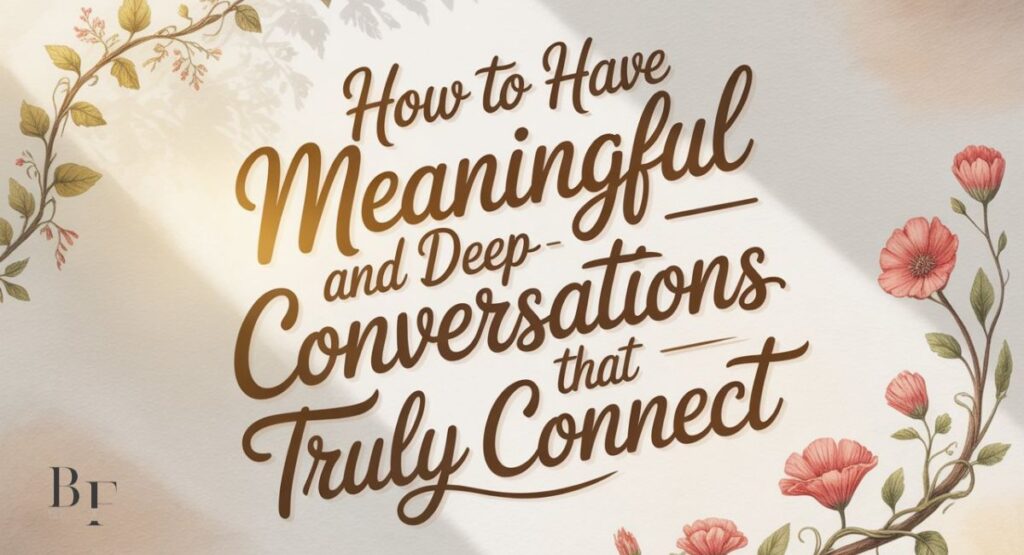Meaningful and deep conversations are the foundation of genuine connection and strong relationships. They go beyond casual talk, allowing real expression of thoughts and emotions. In today’s fast-paced world, many interactions feel rushed, lacking authenticity and depth. When you slow down and truly listen, you create space for understanding, empathy, and trust to grow naturally.
These conversations not only strengthen personal bonds but also improve mental well-being, emotional intelligence, and confidence in social settings. Instead of surface-level exchanges, meaningful dialogue invites curiosity and builds lasting rapport. Learning how to engage in these moments can transform your communication skills and help you create richer, more fulfilling connections in everyday life.
What Makes a Conversation Meaningful?

A meaningful conversation goes beyond daily talk. It creates a sense of resonance. Both people feel seen, heard, and valued. These conversations have depth because they are built on authenticity and emotional sincerity. They bring growth and introspection. In a world where screens dominate, real dialogue feels like a rare gift.
Studies in psychology show that humans thrive on emotional connection-building. When we share emotions honestly, we reduce stress, form stronger relationships, and gain new perspective. A conversation becomes meaningful when it sparks curiosity and inspires change. Such engagement offers not only comfort but also a sense of purpose.
The Mindset Shift: Stepping Into Their Shoes

Deep conversations begin with empathy. This means seeing through another’s perception and feeling what they feel. To achieve this, slow down your thoughts and practice mindfulness. Ask yourself how you would feel in their situation. This approach builds trust and invites openness.
Changing your mindset allows genuine socialization. People feel safer when they sense true care. Good communication is not about impressing others but about being present. You cannot create rapport without showing emotional resonance. Start by practicing observation and letting your natural curiosity guide your questions.
Gaining Trust and Consent to Go Deeper

Deep dialogue requires safety. You cannot expect disclosure without first building trustworthiness. This happens when you respect boundaries and ask for permission to discuss personal matters. A simple “Would you be comfortable talking about this?” shows sincerity and care.
Consent creates comfort. When people feel safe, they will share more openly. In American culture, respecting personal space is important. Demonstrating authenticity and connection-building leads to trust that lasts. Meaningful communication grows when both sides feel valued.
Active Listening: The Heart of Deep Conversations

Great conversations are impossible without strong listening skills. Many hear but do not truly listen. Active listening is behavior that shows engagement. It means giving your full attention, making eye contact, and summarizing what the other person says. This builds trust and shows respect.
The table below highlights levels of listening:
| Listening Level | Description | Impact on Conversation |
| Passive Listening | Hearing words without focus | Weak connection |
| Active Listening | Focused, asking questions, clarifying meaning | Builds trust and rapport |
| Empathic Listening | Understanding emotions and perspective | Creates deep bonding |
Mastering Self-Disclosure Without Oversharing
Disclosure builds closeness. Sharing personal stories invites engagement and shows authenticity. However, oversharing may overwhelm others. Share stories that are relevant and meaningful. Show introspection and allow your personality to shine. This invites others to share, building natural connection.
Boundaries are important in communication. Trust grows when you are mindful of dynamics. Oversharing private pain too early may create discomfort. Instead, show balanced expression and allow trustworthiness to develop naturally.
Reading Nonverbal Cues and Emotional Signals
Words are only part of communication. Nonverbal signals like posture, tone, and gestures say more than sentences. Pay attention to emotions hidden behind words. A soft voice or folded arms reveal feelings beyond speech.
Strong observation skills improve your interaction. A nod, smile, or relaxed stance creates comfort. Table of cues:
| Nonverbal Cue | Likely Meaning | Suggested Response |
| Folded arms | Defensive or closed | Slow pace, invite openness |
| Leaning forward | Interest, engagement | Keep sharing, deepen dialogue |
| Eye contact | Confidence, sincerity | Mirror energy, build trust |
Breaking the Small Talk Barrier
Small talk is a doorway. It can lead to real bonding when used well. Ask thoughtful questions. Move beyond weather and daily routines to topics of intellect or curiosity. Share meaningful experiences that show authenticity.
To shift naturally, practice mindfulness. Listen for openings in conversation. If someone mentions stress, ask about what helps them relax. Such simple acts create resonance.
Common Mistakes That Kill Connection

Many deep talks fail due to poor habits. Interrupting breaks dialogue flow. Talking too much about yourself stops natural engagement. Judging others blocks openness.
Avoid negativity traps. Constantly focusing on problems wears out trust. Instead, show sincerity and emotional balance. Great communication thrives on respect and shared growth.
Conversation Dynamics: Balancing Depth and Positivity

Deep talks should inspire, not drain. Balance heavy moments with humor and warmth. This approach keeps interaction enjoyable. Observation helps you sense when someone feels overwhelmed. Shift gently to lighter topics while maintaining authenticity.
Emotional dynamics matter. Use empathy to maintain healthy rapport. Deep conversations become safe spaces for both people when balanced well.
Building a Habit of Meaningful Communication

Practice makes great communicators. Make daily efforts to build connection. Reflect on talks, improve listening, and engage with intention. Strong conversations create lasting relationships.
Joining book clubs, discussion groups, or local events strengthens your socialization skills. Regular networking introduces you to diverse perspectives. Over time, your confidence will grow, and so will your ability to create meaningful bonding moments.
Bonus: Conversation Tools and Resources
There are tools that can help you master conversation skills. Books like Crucial Conversations offer powerful insights into communication. Podcasts on psychology explain how behavior affects interaction. Apps like Meetup connect you with groups to practice real-life dialogue. Courses in public speaking build confidence and trustworthiness.
Resources enrich learning, but practice creates mastery. Focus on mindfulness and connection-building every day. True growth comes from consistent engagement and a genuine desire to understand others.
FAQs
- What does it mean to have a meaningful conversation?
A meaningful conversation is one where both people feel heard, understood, and emotionally connected, creating trust and lasting impact. - What’s another word for a good conversation?
Another word is “engaging dialogue” or “insightful exchange,” reflecting depth and genuine connection. - How to have deep meaningful conversations with your partner?
Be open, practice active listening, and share feelings honestly while creating a safe, judgment-free space for vulnerability. - How to go from small talk to deep conversation?
Ask thoughtful questions, show genuine curiosity, and gently introduce personal topics to build depth naturally.

Welcome to Believe Flair. Iam Qasim Ali, an AI-Powered SEO, and Content Writer With years of Experience. I help Websites rank higher, Grow traffic and amazing. My Goal is to make SEO and Web designing simple and effective for everyone. Lets achieve more together!

